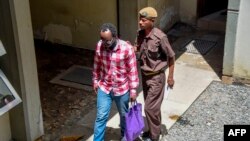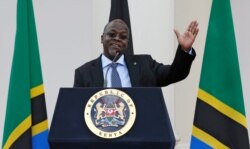Advocacy groups are asking questions about the future of Tanzania's press freedom after the recent release from prison of a prominent Tanzanian journalist.
In July, Erick Kabendera was arrested at his home in Dar es Salaam and charged with money laundering, tax evasion and leading organized crime.
Kabendera has written investigative articles for local and international publications. One of the last articles published before his arrest ran in the East African and bore the headline: “No end in sight as Tanzania’s ruling party, CCM, goes for ‘dissenters.’” It outlined fractures within Tanzania’s ruling party.
To gain his release, Kabendera accepted a plea deal with prosecutors. He agreed to pay a $74,000 fine for failure to pay taxes and $44,000 for money laundering. Reached by phone, Kabendera’s attorney, Jebra Kambole, said his client suffered health problems while incarcerated and chose to accept the plea rather than fight the charges.
“I have the duty to do everything possible to reach an agreement with the prosecutor,” Kambole told VOA’s Swahili service. “So, we reached an agreement and it has been part of his sentencing, for his acceptance of being guilty, and it was agreed to drop the charge for leading a criminal gang. His guilt was based on the agreement we had to reach for his release.”
Since the election of President John Magufuli in 2015, Tanzania has seen restrictions placed on free speech. The Media Services Act passed in 2016 makes it a crime to “write or print seditious content” calling for a maximum jail time of five years for people who violate it. The law has been used to halt the operations of several media outlets including Tanzania’s venerable newspaper The Citizen which saw operations suspended for seven days in February 2019 on charges it had published “fake news.”
“Since Magufuli became president in Tanzania, the environment has drastically deteriorated,” Muthoki Mumo, East Africa Correspondent at the Committee to Protect Journalists, told VOA. “Various tools have been used to repress the media, to silence journalists. Some of these have been laws, some of which were drafted and enacted before Magufuli, but which have been implemented quite aggressively under his presidency.”
Mumo said she personally experienced intimidation while traveling to the country. She and a colleague were detained by plainclothes security personnel for several hours, who physically and verbally harassed them, she said.
“It brought home really how difficult things had become for journalists in Tanzania, for press freedom advocates in Tanzania in general,” said Mumo. “Because we had the advantage that we were able to leave and to go back to our homes. But really, it's sort of contextualized and made us really reflect upon the challenges that the people who operate in this environment on a day to day basis face.”
As Tanzania enters an election year, observers are worried that repression could worsen. There is a blanket ban on political rallies in the country and tensions are high. Amnesty International Tanzania researcher Roland Ebole said that recent arrests could have a chilling effect on the ability of the press to cover elections. He pointed out the irony that Magufuli, nicknamed “the bulldozer,” who has positioned himself as a reformer and anti-corruption advocate, will not allow a free press to operate.
“It's really strange that a government, an administration, that has put itself as one that is there to fight corruption and to build the economy of a country in development would also not want a journalist to report on the same issues and especially to report freely on the same issues,” he told VOA.
This story originated in the Africa Division with reporting contributions from VOA’s Swahili service Abdushakur Aboud.

